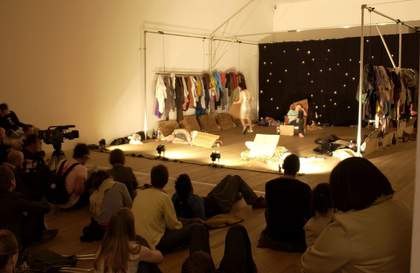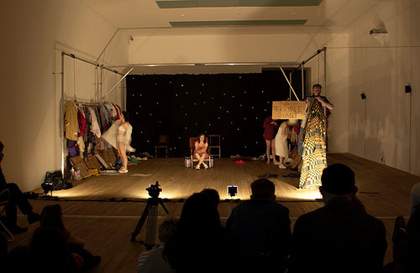12am Awake and Looking Down was a six-hour performance work by Sheffield-based art collective Forced Entertainment, in which five silent performers repeatedly altered their identities through a series of costume and name changes. The performance, which took place in Tate Modern’s Seminar Room, was part of Live Culture, a programme of performance events at Tate Modern from the 27 to 30 March 2003. Bringing together artists, theorists and curators, Live Culture explored the shifting nature of live art practice in relation to the visual arts and examined the expansion of performance art through a series of live events. In particular, the programme explored the role of performance in relation to cultural change and highlighted the ways in which the term live art encompassed an array of contemporary practices that employed performance as a generative force to play with truth and pretence, and to break apart traditional representational codes.
As with most of Forced Entertainment’s durational works, which typically last between six and twenty-four hours, 12am Awake and Looking Down was constructed as an improvisational game, guided by a set of rules; a process that Forced Entertainment have described as, ‘throwing playful and confrontational energy into a tight, controlled structural frame’.1 For this particular game – ‘the game of naming and dressing up’ – the performers were tasked with using a large selection of jumble sale clothing and cardboard signs, which bore a series of names and descriptions, in order to act out new characters.2 In a rather disorderly and frantic fashion the five performers reinvented themselves over and over, momentarily enacting characters such as ‘a promiscuous footballer’, ‘Mark (angry)’, ‘speed freak’, ‘woman in a street incident’ and ‘gay cop’, before moving on to a new placard and yet another persona. Through the constant swapping and rearrangement of props, new situations emerged, stories unfolded and characters developed before being dissolved, discarded and swapped, usually only minutes or even seconds later.
Throughout the performance the five members of Forced Entertainment were mostly on their feet, running from one edge of the small stage to the other to gather more props and continue the rigmarole of their particular task: grab a sign, change clothes, become a different person. Additionally, at intervals throughout the performance a loud, fast-paced music track would play out over speakers, during which time one of the characters would stop what they were doing and run on the spot, finishing only when the music had ended or when one of the other performers decided to take over from them. These high-energy running breaks seemed to have little purpose other than to accelerate and amplify, for the audience, the fatigue which inevitably overcame the performers as the six hours progressed. Each time the music track commenced, imploring one of the actors to run, their movements became slower and faces grew more weary, until, at the end of the performance, the final runner seemed near to collapse, drained of energy by the highly intense and sustained engagement required of prolonged improvisation and physical exertion.
Forced Entertainment described the effect of exhaustion staged in their work in this way:
After three hours your tongue is loose, the connections in your brain are scrambled. Fatigue has set in and that’s been followed by hysteria. You find yourself doing things you did not expect, making unplanned moves, speaking or moving without thinking ahead. In this state you are naked, defences down.3
12am Awake and Looking Down centred on the breakdown of the performers’ ability to sustain the work and the loss of control prompted by fatigue. As the performers grew both physically and mentally tired their repertoire of ideas faded and, toward the end of the piece, their ability to articulate speech or to move diminished. Rather than the enactment of particular characters, the performance instead, focused on the effort and failures of the actors to ‘act’, and on the labour of performance itself.
Clare Gormley
September 2015


